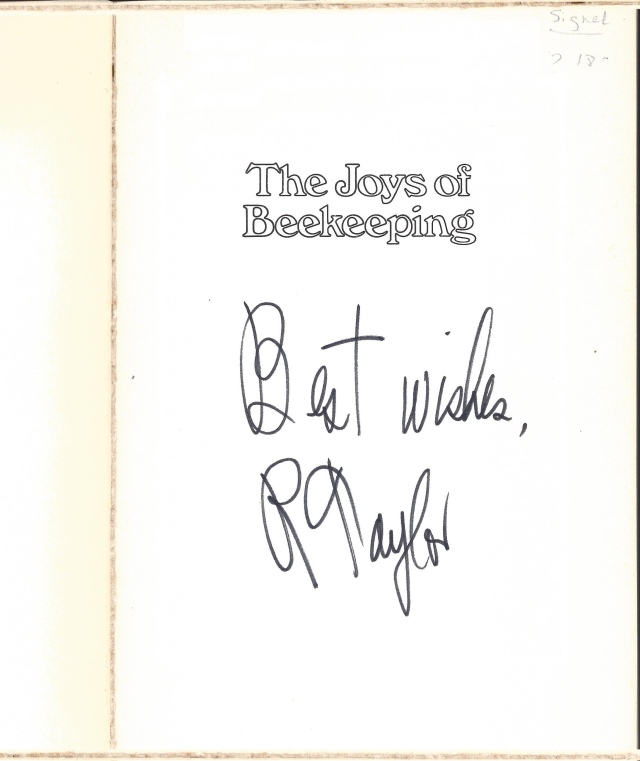
[ad_1]
Revisiting Richard Taylor on his 104th birthday.
He died 20 years in the past. However Richard Taylor is fascinating sufficient to recollect, not less than each November fifth when a small a part of the world stands to salute the sensible beekeeper and thinker. Right here’s my tribute, dusted off for right this moment’s publish.

As I proceed to plod together with a myriad of misadventures, I really feel obligated to apologize for the infrequency of those dangerous beekeeping posts. Sorry. However I’m not going to apologize for often repeating a posting from the previous – particularly this one, which celebrates the nice business beekeeper, author, and philosophy professor, Richard Taylor. He would have been 104 years previous this November fifth. I first revealed a Richard Taylor tribute just a few years in the past. I ponder what he’d consider our messed-up world if he have been alive and philosophizing right this moment…
At the moment is the anniversary of the beginning of our beekeeper-hero, Professor Richard Taylor. A business beekeeper with simply 300 hives, he was an early champion of plastic bee tools and the spherical comb honey system. He was additionally a thinker who “wrote the guide” on metaphysics. He actually wrote the guide on metaphysics – for many years, his faculty textual content Metaphysics launched first-year philosophy college students to probably the most basic facet of actuality – the character of cosmology and the existence of all issues.
Though his vocation of philosophy was speculative, unprovable, and summary to the best diploma, Richard Taylor was as frequent and down-to-earth because it’s doable to turn into – with some minor tinges of eccentric behaviour added to the combo. I’ll write about his philosophy and the way it formed his politics, however first, let’s have fun his beekeeping.
Richard Taylor and his twin brother have been born November fifth, 1919. It was shortly after their father had died. That left a widowed mom to boost an impoverished household through the Nice American Despair. Richard was fourteen when he acquired his first hive of bees in 1934 – the 12 months {that a} quarter of People have been unemployed and soup strains resulting in Salvation Military kitchens stretched for blocks. He started beekeeping that 12 months, and apart from submarine obligation as an officer throughout World Warfare II, he was by no means removed from bees. He revered trustworthy exhausting work and the worth of a penny, however as a younger man, he nonetheless drifted unfocussed, attempting faculty, then quitting, after which taking varied uninspiring jobs.
Within the US Navy, he spent evenings on his bunk in a sub, descending into the gloomy passages of Arthur Schopenhauer. Someway the nihilistic thinker appealed to Taylor and satirically gave him an curiosity in life. This led Taylor again to high school. He turned a thinker himself.
Richard Taylor earned his PhD at Brown College, then taught at Brown, Columbia, and at last Rochester, from which he retired in 1985 after twenty years. He additionally held courtroom as a visiting lecturer at Cornell, Hamilton, Hartwick, Hobart and William Smith Faculty, Ohio State, and Princeton. His finest years have been at Rochester the place he philosophized whereas his trusted German shepherd Vannie curled underneath his desk. Richard Taylor sipped tea and instructed his undergrads in regards to the historical philosophers – Plato, Epicurus, Aristotle, Xeno, and Thales. Within the earlier days, he typically drew on a cigar whereas he illuminated his flock of philosophy college students. Those that attended his courses remarked on his easy, unpretentious language. In addition they famous that he was normally wearing bee garb – khakis and boots. As quickly because the lecture ended and the final pupil withdrew from the corridor, he and Vannie rapidly disappeared to the apiaries.
Taylor, the hippie beekeeper
It might be unfair to explain Dr Richard Taylor as a hippie beekeeper, however maybe he was precisely that. As a beekeeper, he was reclusive. He refused to rent assist. Moderately than take care of clients, he arrange a roadside stand the place folks took honey and left cash with out ever assembly him. In his store or out amongst his bees, Taylor disdained huge noisy tools. He generally took a garden chair and a thermos of tea to his apiaries so he may loosen up and hearken to the bugs work, however I doubt that he did this a lot. By means of the pages of American Bee Journal, Bee Tradition, and several other beekeeping books, he described finest beekeeping practices as he noticed them – and people practices required exhausting work and self-discipline greater than relaxed lawn-chair introspection.

Operating 300 colonies alone whereas holding a full-time job and writing a guide each second 12 months calls for focus. His bees have been well-cared for, every producing a couple of hundred kilos yearly in an space the place such crops are uncommon. By 1958, he was switching from extracting, which he disliked, to comb honey manufacturing, which he cherished. Comb honey takes a extra expert beekeeper and higher consideration to particulars, however in return it requires much less tools, a smaller truck, and no settling tanks, honey pumps, whirling extractors, or 600-pound drums. “Only a pocket knife for cleansing the combs,” he mentioned.

To me, it’s shocking that Richard Taylor embraced the spherical comb honey tools referred to as Cobanas. The shocking factor is that the tools is plastic. Studying Taylor’s books, one realizes his affinity for easy instruments and old school methods. In that context, plastic appears unsuitable. Nevertheless it’s not.
Previously, comb honey sections have been square-shaped and comprised of wooden. The wooden needed to be lightweight and mushy sufficient to bend into containers with out breaking. The wooden that suited this want within the japanese USA was basswood (additionally referred to as linden, Tilia spp.). Early within the twentieth century, over one million comb honey sections have been produced annually – resulting in the destruction of forests of the stately nectar-producing bushes. Plastic is lightweight, sturdy, and in the end very sensible for bee tools. It may be recycled, a tangible profit to an individual as frugal as Richard Taylor. He was positive that Cobana tools, invented by a Michigan doctor within the Fifties, would result in a easy sensible manner of beekeeping. Taylor was so enthused that in 1958, residing in Connecticut, he wrote his first beekeeping article in regards to the new plastic tools for the American Bee Journal. Right here’s the photograph that accompanied his story.

Richard Taylor’s son, Randy, packing spherical comb honey, 1958. (Picture from ABJ).
His comb honey undertaking labored. Richard Taylor, the beekeeper, was financially profitable. In right this moment’s {dollars}, his comb honey bee farm returned about $75,000 revenue annually – a tidy sum for a pastime and greater than sufficient spare change to indulge his behavior of frequenting farmer’s auctions the place he’d enjoyment of carrying residence a stack of empty used hive our bodies that might be had for a greenback.
Taylor, the instructor
Richard Taylor immensely loved educating and lamented what he referred to as “grantsmanship” which arose in America whereas he was a professor. Grantsmanship is the ability of securing funding for one’s tasks whereas probably ignoring the elemental duties of educating. Unethical grantsmanship, in fact, can result in huge {dollars} flowing to researchers who’re keen to assert that sugar, for instance, doesn’t contribute to weight problems and cigarette smoke does little greater than sharpen one’s senses. Richard Taylor noticed the compromised ambiance. He additionally regretted the demise of fine college instructors changed “largely by graduate college students, some from overseas with restricted potential to talk English. Lecturers who merely learn in a monotone from notes aren’t unusual,” he wrote.
In the meantime, the (generally unethical) pursuit of grants was accompanied by the rise of the “publish or perish” syndrome. In his personal discipline, Taylor identified that educational philosophers engaged in “a sort of mental drunkenness, a lot of which finally ends up as articles in educational journals, thereby swelling the authors’ lists of publications.” Taylor wrote extensively on this in 1989, saying that there have been 93 (!) educational philosophy journals revealed within the USA alone that 12 months – seldom learn, seldom good, however filling mailboxes with materials to safe a professor’s promotions.
This was not the educational world that Richard Taylor sought when he started his profession within the Fifties, but it surely was the world he ultimately left. Though he wrote 17 books – principally philosophical essays but additionally a number of quite good beekeeping manuals – he didn’t publish many educational papers. He spent extra time within the lecture halls and together with his bees than he did “considering the existential actuality of golden mountains and writing papers about them”, as he put it.
Taylor, the thinker
I’m solely going to provide this one brief passage about Richard Taylor, the thinker. He studied and taught metaphysics and ethics. His essays on free will and fatalism are famend and influential, even right this moment. I’ve by no means taken a philosophy course, so something I say in regards to the topic will most likely finish with me embarrassing myself. Nevertheless, just a few years in the past, throughout a winter journey to Florida, a replica of Richard Taylor’s Metaphysics travelled with me. I learn each phrase and I believe that I understood it on the time. For me, most of it was clear frequent sense. Because it was well-crafted and fascinating, Taylor could have lulled me into believing that I understood his metaphysical description of the universe, even with simply this cursory introduction. At any charge, I felt that what he wrote wasn’t totally different than what I’d come to find by myself, though it was far more elegantly offered than I may ever handle.
Taylor, the Republican

After I noticed Richard Taylor – simply as soon as, at a beekeepers’ assembly – I certainly thought that he was a hippie, a typical sufficient type of beekeeper within the Seventies. His belt was baler twine and a broad-rimmed hat hid his face, although a scraggy beard protruded. I used to be shocked to later uncover that Richard Taylor recognized as a conservative and voted Republican. However he was additionally an atheist, advocated for girls’s rights, and late in life (although happy with his navy service) he turned a pacifist, “coming late to the knowledge,” he mentioned. He valued exhausting work, self-sufficiency, and independence. He disliked Nixon, however gladly voted for Reagan. He even wrote a New York Occasions editorial praising Reagan’s inaugural handle whereas providing perception on what it means to be an introspective conservative within the Nineteen Eighties.
At age 62, nonetheless a professor of philosophy on the College of Rochester, and the current creator of the guide Freedom, Anarchy, and the Regulation, he penned that widely-circulated New York Occasions opinion piece. Taylor wrote that in Reagan’s inaugural handle, the brand new president reminded us that “our authorities is meant to be certainly one of restricted powers, not one which tries to find out at no cost residents what’s finest for them and to ship them from all method of evil.” Richard Taylor then goes on to warn that “political subversion . . . is the try and subordinate the Structure to another philosophy or creed, believed by its adherents to be nobler, wiser, or higher.”
Taylor warned of anti-constitutional subversion in American politics, “if anybody have been to attempt to change the Structure with, say, the Koran, then nobody may doubt that this could be an act of subversion . . . Equally, anybody subordinating the rules embodied within the Structure to these of the Bible, or to these of one of many varied church buildings or creeds claiming scripture as its supply, is committing political subversion.”
Taylor tells us that conservative spokesmen of Reagan’s period – he mentions Jerry Fallwell and others – are proper saying that “it’s not the federal government’s operate to pour blessings upon us within the type of artwork, well being, and schooling, nonetheless fascinating these items could also be.” Nor, Taylor mentioned, is it constitutional for “the Authorities to transform schoolrooms into locations for prayer conferences, or to compel impoverished and single women, or anybody else, to bear misbegotten youngsters, to make pronouncements on evolution, to instruct residents on household values, or to find out which books can and can’t be put in our libraries or positioned inside attain of our youngsters. . . it may possibly by no means, within the eyes of the real conservative, be the position of Authorities to power such claims upon us. The Structure explicitly denies the Authorities any such energy.”

I believe that Richard Taylor could be politically annoyed right this moment. The Republicans have drifted ever-further from small authorities and have expanded their attain into private affairs whereas the Democrats have pushed ahead intensive security nets. A real libertarian celebration, or one balancing fiscal conservatism with social liberalism, reminiscent of Taylor appears to want for, gathers little assist in America right this moment.
I hope that my abstract of Richard Taylor’s political philosophy has not offended his most ardent followers. I’ve tried to distill what Taylor considered good authorities – I agree with a lot of it, however disagree with some. It’s offered as only one aspect of his persona. Taylor was sophisticated. His final guide, written in his 80s whereas he was dying from lung most cancers, is about marriage – but his personal marriages had heartbreaks.
He confirmed different sophisticated and surprising quirks. For instance, he was an avowed humanist, but confirmed a non secular nature. In his workplace, he mounted a certificates which honored him as a laureate of the Worldwide Academy of Humanism, one of many few folks chosen over time. Others included Carl Sagan, Christopher Hitchens, Isaac Asimov, Richard Dawkins, Richard Leakey, Steven Pinker, Salman Rushdie, E.O. Wilson, Elena Bonner, and Karl Popper. He was in extraordinarily elevated mental firm. Taylor belonged there among the many different atheists, even when he as soon as metaphorically wrote in his hottest bee guide, “the methods of man are generally, just like the methods of God, wondrous certainly.”
Taylorisms within the bee yard

Richard Taylor was sophisticated for a easy man. It’s mentioned that he couldn’t stand complacency, vainness or narcissistic habits, but he appeared to get alongside effectively in gatherings of beekeepers the place such attitudes are sometimes on show. He had a love of paradox and Socratic whimsy, but he was disciplined and direct as a author. He delighted within the pessimism of Schopenhauer, but he was not a pessimist himself. As an alternative, he was fairly a puzzle.
I’ll finish this little essay with knowledge from Richard Taylor, the beekeeper. Taylor’s most interesting bee guide, The Joys of Beekeeping, is replete with homey truisms that each aspiring beekeeper ought to acknowledge and embrace. The guide itself is slim, entertaining, private, and really instructive of the artwork of protecting bees. Or, as Taylor himself calls beekeeping, “residing with the bees. They maintain themselves.”
Right here, then, are some choose Taylorisms:
Beekeeping success calls for “a sure demeanor. It isn’t a lot gradual movement that’s needed, however a managed method.”
“…no man’s again is unbreakable and even beekeepers get older. When full, a mere shallow tremendous is heavy, weighing forty kilos or extra. Deep supers, when crammed, are ponderous past sensible restrict.”
“Some beekeepers dismantle each hive and scrape each body, which is pointless because the bees quickly glue the whole lot again the best way it was.”
“There are just a few guidelines of thumb which might be helpful guides. One is that if you find yourself confronted with some drawback within the apiary and also you have no idea what to do, then do nothing. Issues are seldom made worse by doing nothing and are sometimes made a lot worse by inept intervention.”
. . . and my very own favourites . . .
“Woe to the beekeeper who has not adopted the instance of his bees by protecting in tune with imperceptibly altering nature, having his tools at hand the day earlier than it will be wanted quite than the day after. Bees don’t put issues off till the season is upon them. They’d not survive that season in the event that they did, in order that they anticipate. The beekeeper who’s out of step will sacrifice serenity for anxious last-minute preparation, and that crop of honey is not going to materialize. Nature doesn’t wait.”
“Typically the world appears on the verge of madness, and one wonders what restrict there may be to greed, aggression, deception, and the thirst for energy or fame. When reflections of this kind threaten one’s serenity, one may be glad for the bees…” – The Joys of Beekeeping

[ad_2]